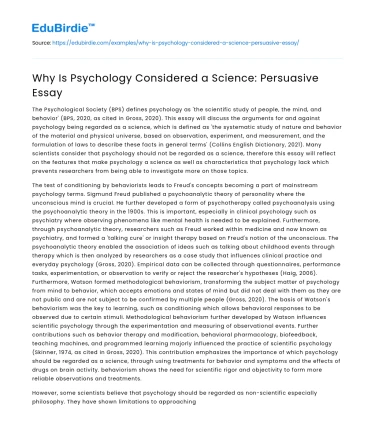The Psychological Society (BPS) defines psychology as 'the scientific study of people, the mind, and behavior' (BPS, 2020, as cited in Gross, 2020). This essay will discuss the arguments for and against psychology being regarded as a science, which is defined as 'the systematic study of nature and behavior of the material and physical universe, based on observation, experiment, and measurement, and the formulation of laws to describe these facts in general terms' (Collins English Dictionary, 2021). Many scientists consider that psychology should not be regarded as a science, therefore this essay will reflect on the features that make psychology a science as well as characteristics that psychology lack which prevents researchers from being able to investigate more on those topics.
The test of conditioning by behaviorists leads to Freud's concepts becoming a part of mainstream psychology terms. Sigmund Freud published a psychoanalytic theory of personality where the unconscious mind is crucial. He further developed a form of psychotherapy called psychoanalysis using the psychoanalytic theory in the 1900s. This is important, especially in clinical psychology such as psychiatry where observing phenomena like mental health is needed to be explained. Furthermore, through psychoanalytic theory, researchers such as Freud worked within medicine and now known as psychiatry, and formed a 'talking cure' or insight therapy based on Freud's notion of the unconscious. The psychoanalytic theory enabled the association of ideas such as talking about childhood events through therapy which is then analyzed by researchers as a case study that influences clinical practice and everyday psychology (Gross, 2020). Empirical data can be collected through questionnaires, performance tasks, experimentation, or observation to verify or reject the researcher's hypotheses (Haig, 2006). Furthermore, Watson formed methodological behaviorism, transforming the subject matter of psychology from mind to behavior, which accepts emotions and states of mind but did not deal with them as they are not public and are not subject to be confirmed by multiple people (Gross, 2020). The basis of Watson's behaviorism was the key to learning, such as conditioning which allows behavioral responses to be observed due to certain stimuli. Methodological behaviorism further developed by Watson influences scientific psychology through the experimentation and measuring of observational events. Further contributions such as behavior therapy and modification, behavioral pharmacology, biofeedback, teaching machines, and programmed learning majorly influenced the practice of scientific psychology (Skinner, 1974, as cited in Gross, 2020). This contribution emphasizes the importance of which psychology should be regarded as a science, through using treatments for behavior and symptoms and the effects of drugs on brain activity. behaviorism shows the need for scientific rigor and objectivity to form more reliable observations and treatments.
Save your time!
We can take care of your essay
- Proper editing and formatting
- Free revision, title page, and bibliography
- Flexible prices and money-back guarantee
However, some scientists believe that psychology should be regarded as non-scientific especially philosophy. They have shown limitations to approaching psychology as a science particularly due to the lack of exploration of topics that cannot be investigated using scientific methods as it is not available for taking the research to collect the necessary data. This can be seen in contemporary psychology which is difficult to define its boundaries due to having many theories (Gross, 2020) which cannot be investigated using scientific methods and are neglected. For example, limits of human possibilities, what causes the most extreme behavioral change, or a change in a human's state of mind, such topics would be very difficult or impossible to approach scientifically. Furthermore, collecting evidence to reinforce an idea or theory can cause researchers to form scientific methods that falsely generate evidence, which is then referred to as pseudoscience. Observations can be made however, rigorous methods and models for such theories have not been developed to produce measurements to be used as evidence (Krpan, 2021). Furthermore, theories developed by Freud due to rejected assumptions resulted in the psychodynamic approach such as the ego psychology and psychosocial theory. This approach is criticized to be unscientific as it cannot be disproved especially as is it mainly based on the unconscious (Gross, 2020).
There are certain characteristics that most psychologists and philosophers of science would agree that define science. One of the major features of science is hypothesis testing which psychology uses where predictions are made on behaviors under certain conditions and experiments were carried out by researchers (Gross, 2020). This is shown in conditioning studies such as âthe Little Albert case' where Watson and Rayner took an interest in Ivan Pavlov's study in conditioning. They hypothesized that humans can become fearful of animals and objects that are considered to be typically not fearful (Vincent, 2021). The importance of hypothesis testing is to find a possible relationship between an independent and the dependent variable due to people not predicting outcomes, as well as they, had thought.






 Stuck on your essay?
Stuck on your essay?

